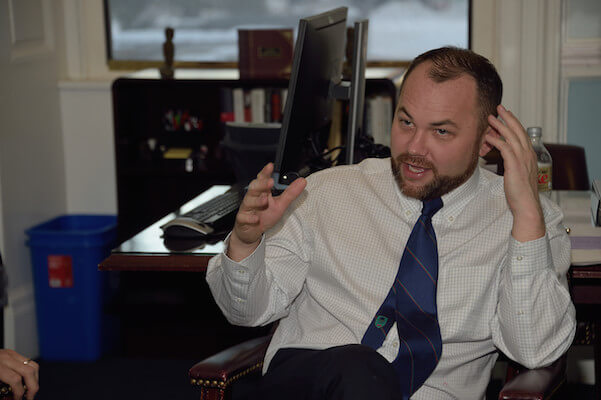Before Congress sends more troops to Iraq, it had better ask just what they will be doing. A new report from a non-governmental organization concludes that strengthening the current government will aggravate existing problems.
Imagine if the U.S. changed its mission in Iraq and troops were guarding civilian populations-protecting banks as well schools and hospitals or guarding a revitalized transportation infrastructure along the Tiberius and Euphrates, Iraq's two great rivers. The government there should have as its goal security for all the Iraqi people regardless of religion and move toward achieving that aim by encouraging interactions among the currently warring tribes. Moving food and goods along the rivers would jump start the laborious task of restoring connections across sectarian lines.
Before Congress sends more troops to Iraq, it had better ask just what they will be doing.
The new policy would accentuate the ties between the people and their government. Pensions would be restored. Soldiers would be paid-including those who were in Saddam Hussein's armies. Those soldiers laid down their weapons and let the U.S. forces gain an easy victory after the invasion. Their pacifism was rewarded by a loss of jobs and pay. Naturally many of them became insurgents.
For a new approach to work, President George W. Bush would have to give up his objections to amnesty. Thinking that way is outside the box for a knee-jerk law-and-order conservative. But observers agree amnesty is one way that the currently armed groups might decide to support an Iraqi government.
Making policy choices like these is the first order of business. Before sending more troops into Iraq, we must clearly articulate their mission. Will they continue to raid people's home looking for weapons and creating enemies and new recruits for the insurgents? Will soldiers run prisons, torture-excuse me, conduct interrogations-and otherwise repeat mistakes of the Vietnam era?
A new analysis by the International Crisis Group fleshes out the implications-and the shortcomings-of the Baker/Hamilton report. It makes their recommendations understandable and in many cases offers new and arresting proposals.
The Crisis Group, based in Brussels, has been preparing recommendations on international trouble spots for a decade. This group of international specialists is guided by luminaries like the billionaire philanthropist George Soros, Carla Hills, the Clinton administration's chief trade negotiator, and retired General Wesley Clark. The co-chairs are veteran internationalists-Thomas Pickering of the United States, who variously served as ambassador to Israel, India, Russia, and the United Nations, and Christopher Patten of the United Kingdom, who was the last British administrator in Hong Kong and the European Commissioner for foreign relations, and is now chancellor of Oxford.
Reports had circulated during the past year that the Group might receive the Nobel Peace Prize. It didn't, but the speculation demonstrated its standing in the global community.
That group's report explains in much more detail than Baker/Hamilton the changes in U.S. policy that must occur to develop a viable political solution. Staying the course must be abandoned. A dramatic and drastic change is recommended, and the Baker/Hamilton group is criticized for its caution.
The report is more lucid than the American study and demonstrates that an international consensus exists for transferring management of the war to a new support group engaged by the United Nations Security Council with administrative control exercised by the U.N. secretary general. The international report is more persuasive than the dry consensus statement developed by Baker/Hamilton.
Consider this excerpt: The United States and neighboring states “are taking measures in anticipation of the outcome they most fear: Iraq's descent into all-out chaos and fragmentation. By increasing support for some Iraqi actors against others, their actions have all the wisdom of a self-fulfilling prophecy: steps that will accelerate the very process they claim to wish to avoid.” A change in strategy means abandoning the tactics of favoring Sunnis or Shiites.
The key disagreement between Baker/Hamilton and the International Crisis Group-and it is a major one-revolves around the nature of the current government in Iraq. “Contrary to the Baker-Hamilton report's suggestion, the Iraqi government and security forces cannot be treated as privileged allies to be bolstered,” the international report concluded.
Baker/Hamilton characterizes the current Iraqi regime as a “'government of national unity': it is nothing of the sort,” the international group argues. Baker/Hamilton recognizes that the current Iraqi government takes sides in the religious violence but doesn't draw the appropriate conclusion.
“The U.S. must come to terms with the fact that the current government is merely one among many parties to the conflict-a situation the report accurately describes, but whose consequences it fails to draw,” the International Crisis Group says of the U.S. Study Group findings. “The constitutional revision it rightly calls for is seen as preceding rather than flowing from national reconciliation-a sequence that virtually guarantees its failure.”
These are sharp criticism aimed at Baker/Hamilton, but friendly ones-designed to reduce tension in the Middle East and create a sense that the interests of the region converge rather than conflict. The hopes for a change in political direction lie with Congress. It must conduct oversight seriously. The impact of Baker/Hamilton will be measured by congressional probing of the Bush administration call for escalation.
The outcome is still in doubt and Baker/Hamilton's rejection of further troop increases may yet prevail. But Congress is the only group that can turn peace proposals into reality.
Congress will only face this reality if voters tell them to ask the tough questions. This is one of those moments when we can impact public policy. The International Crisis Study Group report is only a few clicks away on your computer, at http://www.crisisgroup.org.
<
































